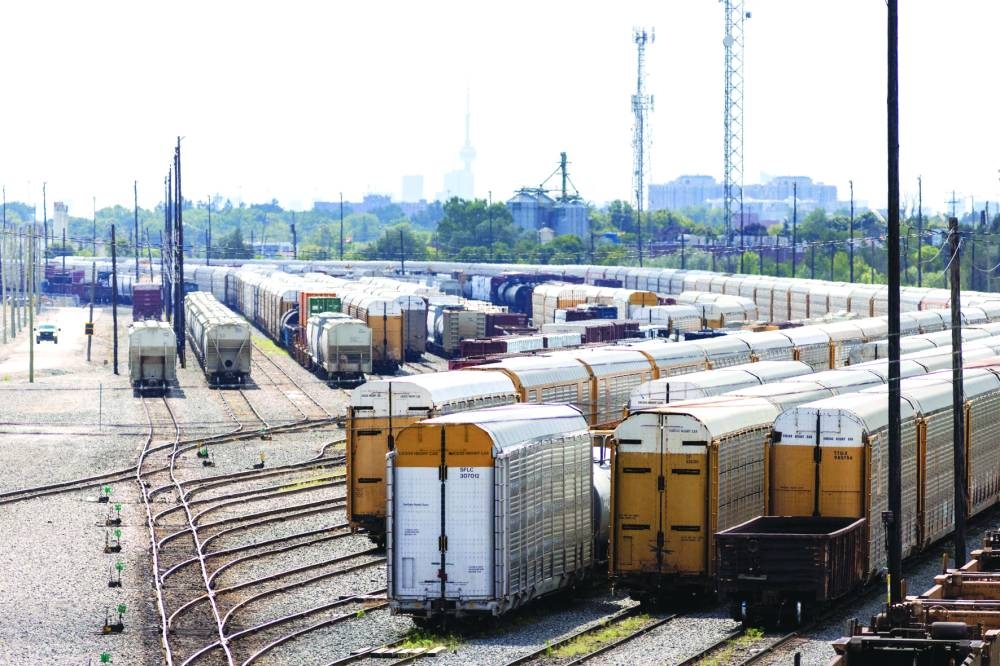Freight rail operations were set to resume across Canada following federal intervention to end a crippling disruption triggered by labour disputes at the country’s two main operators.
Work stoppages at Canadian National Railway (CN) and Canadian Pacific Kansas City (CPKC) locked out nearly 10,000 workers and threatened to upend the North American economy, which is heavily dependent on rail operations.
Labour Minister Steven MacKinnon said he had hoped collective bargaining negotiations between the companies and Teamsters Canada Rail Conference (TCRC), the union representing the workers, would resolve the conflict.
However, recognising that they were at an “impasse”, MacKinnon ordered current collective agreements extended and “operations on both railways to resume forthwith”.
“Canada’s economy cannot wait for an agreement that has been delayed for a very long time and when there is a fundamental disagreement between the parties,” he said in a statement.
MacKinnon’s decision marked a change of mind by the Liberal government of Prime Minister Justin Trudeau, which had said it wanted to see the matter settled at the bargaining table.
Trudeau, in a post on X, said “collective bargaining is always the best way forward”, but added governments must act when faced with serious consequences to supply chains and the workers who depend on them.
“We gave negotiations every possible opportunity to succeed...but we have an impasse here,” MacKinnon said. “And that is why we have come to this decision today.”
His order allows rail traffic to resume, ending the suspension that began at 12.01am on Thursday.
The resumption could take up to two days.
In a new statement during the early hours yesterday, the Teamsters union posted on X that it had taken down picket lines at CN.
MacKinnon directed the parties to hold talks on a new agreement under the aegis of the Canada Industrial Relations Board.
The disputes centred around workers’ concerns over long hours and fatigue, leading to dangerous working conditions.
The companies and the union had blamed each other for the work stoppage that followed months of fruitless negotiations.
It is the first time Canada has faced simultaneous work stoppages at the two companies, which in the past have negotiated labour deals in alternate years.
Canada is the world’s second-largest country by area, and relies heavily on rail transport.
CN and CPKC have tracks that stretch from the Atlantic to the Pacific coasts and south into the United States.
They carry an estimated C$1bn ($730mn) worth of goods daily, including grains and potash, cars, petroleum products and timber.
Business groups and farmers have warned of costly disruptions to the G7 economy.
“It really is devastating for the grain industry, because we can’t move the product,” Wade Sobkowich, head of the Western Grain Elevator Association, told AFP.
US rail companies and overseas shippers had already stopped accepting some goods destined for Canada in anticipation of a disruption.
With the neighbouring countries’ supply chains deeply integrated, the US and Canadian chambers of commerce issued a joint statement on Tuesday calling on the Canadian government to take action.
“A stoppage of rail service will be devastating to Canadian businesses and families and impose significant impacts on the US economy,” they had warned.
CN had sought to force the temporary relocation of workers to fill staff shortages in parts of Canada, which the union rejected.
“The union did not respond to another offer by CN in a final attempt to avoid a labour disruption,” it said in a statement.
CPKC said early on Thursday that it had “bargained in good faith”, but said the Teamsters were making “unrealistic demands” and a negotiated outcome was out of reach.
The two rail operators “have shown themselves willing to compromise rail safety and tear families apart to earn an extra buck”, said Teamsters union president Paul Boucher.
Unions typically do not want contracts decided through arbitration as it removes their leverage from withholding labour to secure better terms.
The left-leaning New Democratic Party, which has traditionally received strong union support and props up Trudeau’s government, opposed the government’s decision.
“Justin Trudeau has just sent a message to CN, CPKC and all big corporations – being a bad boss pays off,” party leader Jagmeet Singh said in a statement.
The Anderson Economic Group, which specialises in estimating losses, said a three-day lockout could cost $303mn and predicted a $1bn loss for a week-long disruption.

This picture taken on Thursday shows containers stacked at the CPKC Toronto yard, after Canadian National Railway (CN) and Canadian Pacific Kansas City (CPKC) locked out workers following unsuccessful negotiation attempts with the Teamsters union. – Reuters
